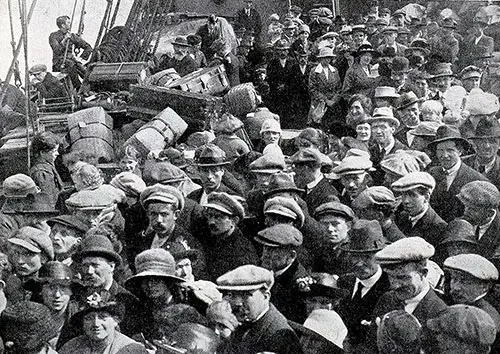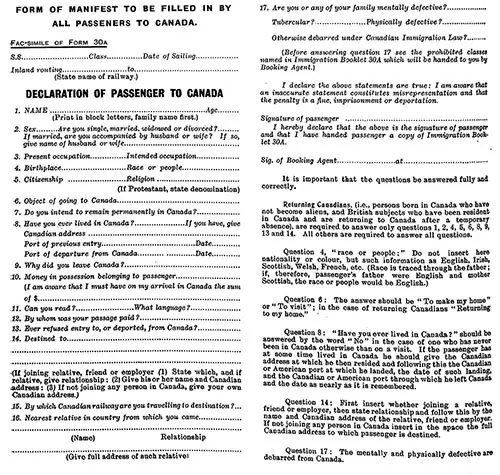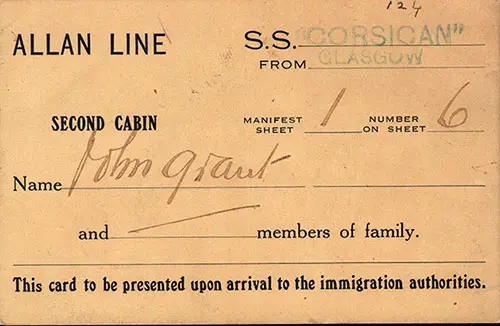Canadian Immigration Regulations - 1921

Third-Class Passengers on Board the Canadian Pacfic SS "Melita" Ready for Medical Inspection. Canada Today, 1921-22. GGA Image ID # 14a652620a
The Canadian Department of Immigration and Colonization continues to apply such immigration regulations as are required to carry out the policy adopted by the Canadian Parliament.
The regulations, which may vary from time to time dependent upon financial, commercial, industrial and labor conditions in Canada generally or in any locality, are made in the interests of the newcomer.
The Canadian Immigration Act prohibits the landing in Canada of the following: —
(a) Idiots, imbeciles, feeble-minded persons, epileptics, insane persons and persons who have been insane at any time previously.
(b) Persons afflicted with tuberculosis in any form or with any contagious or infectious disease which may become dangerous to the public health.
(c) Immoral persons and persons who have committed crime involving moral turpitude.
(d) Professional beggars or vagrants, persons afflicted with chronic alcoholism, and persons likely to become a public charge.
(e) Anarchists, persons who disbelieve in or are opposed to organized government, including those who belong to organizations holding such views.
(f) Immigrants who are nationals of Germany, Austria, Hungary, Bulgaria, or Turkey; Doukhobors, Hutterites and Mennonites.
(g) Persons who have been rejected at a Canadian port or who have been deported from Canada.
(h) Persons over 15 years of age who are unable to read.
(i) Immigrants who are dumb, blind or otherwise physically defective. Under certain conditions, individuals of this class may be admitted, but only after special reference to the Superintendent of Emigration.
(j) Persons not included within any of the foregoing prohibited classes, who upon examination by a medical officer are certified as being mentally or physically defective to such a degree as to affect their ability to earn a living.
All women going to Canada to settle must have a permit from the Superintendent of Emigration, unless accompanied by husband, father, mother or such other relative as may be approved by him.
The Canadian Immigration Act authorizes the Department to :—
(a) Prohibit the landing in Canada or at any specified port of entry in Canada of any immigrant who has come to Canada otherwise than by continuous journey from the country of which he is a native or naturalized citizen, and upon a through ticket purchased in that country or prepaid in Canada.
(b) Prohibit the landing in Canada of passengers brought to Canada by any transportation company which refuses or neglects to comply with the provisions of this Act.
(c) Prohibit or limit in number, for a stated period or permanently, the landing in Canada, or the landing in any specified port or ports of entry in Canada, of immigrants belonging to any nationality or race or of immigrants of any specified class or occupation, by reason of any economic, industrial or other condition temporarily existing in Canada, or because such immigrants are deemed unsuitable, having regard to the climatic, industrial. social, educational, labor and other conditions or requirements of Canada, or because such immigrants are deemed undesirable owing to the peculiar customs, habits, modes of life and methods of holding property, and because of their probable inability to become readily assimilated, or to assume the duties and responsibilities of Canadian citizenship within a reasonable time after their entry.
(d) Prohibit the entry or landing in Canada of any person who is not in possession of a valid passport issued in and by the Government of the country of which such person is a subject or citizen, and for the purposes of this regulation, such passport must be presented within one year of the date of its issue and if not a British passport must carry the visa of a British diplomatic or consular officer given only in the country where the passport was issued ; provided that this regulation shall not apply to British subjects coming to Canada directly or indirectly from the United Kingdom of Great Britain and Ireland, the United States of America, or any self-governing British Dominion or Newfoundland ; nor shall it apply to American citizens entering Canada from the United States of America or vice versa ; nor to persons who have been resident in the United States of America for a period of at least one year immediately prior to their entry to or landing in Canada.
(e) Prohibit the landing in Canada of any immigrant who does not possess in his own right the minimum amount of money hereinafter prescribed:
In the case of an immigrant of the age of 18 years or upwards the sum of $250 and in the case of an immigrant of the age of 5 years and under the age of 18 years the sum of $125 in addition, in each case, to ticket or sufficient money to purchase transportation to destination in Canada.
Provided, that in the case of an immigrant who is the head of a family and is accompanied by one or more members of his family, the money qualification, in addition to ticket or sufficient money to purchase transportation to destination in Canada, shall be $125 for each member of the family, (except the head of the family who shall have $250), of the age of 18 years and upwards, and $50 for each member of the family of the age of 5 years and under the age of 18 years.
Provided further that the immigration officer in charge may, notwithstanding anything hereinbefore contained, exempt any immigrant from the operation of the foregoing regulation if it is shown to his satisfaction that : (a) The immigrant, if a male, is going to assured employment at farm work, and has the means of reaching the place of such employment ; or (b) the immigrant, if a female, is going to assured employment in domestic service, and has the means of reaching the place of such employment ; or (c) the immigrant, whether male or female, is of one of the following descriptions, and is going to reside with a relative of one of the following descriptions, who is able and willing to support such immigrant and has the means of reaching the place of residence of such relative: wife going to husband, child going to parent, brother or sister going to brother, minor going to married or independent sister, parent going to son or daughter.
The Canadian Government is most anxious to prevent passengers being booked to Canada unless such are reasonably sure of being able to comply fully with the regulations which are in force on arrival at any port in Canada or by any American port.

Form of Manifest to be Filled In by All Passengers to Canada. Declaration of Passenger to Canada. (Form 30A) Canada Today, 1921-22. GGA Image ID # 14a65756fc
Before passengers disembark from a steamer in Canada, they are required to fill in certain forms for manifest purposes on board, and receive from the purser of the ship a "landing card" which is presented to the immigration officials at the port of landing. Form 30A (see above) is to be filled up before booking passage.

Example of a Landing Card for Second Cabin Passenger John Grant on Board the SS Corsican of the Allan Line Departing from Glasgow circa Early 1900s. Immigration Document Collection, Gjenvick-Gjønvik Archives. GGA Image ID # 14a68c4c2e
Owing to unemployment which may prevail in various centers in Canada from time to time passengers should make every enquiry and be able to comply with every regulation, or they will not be allowed to land in Canada.
Robert J. Arnott, M.A., Ed., "Emigration and Settlement: Immigration Regulations," in Canada Today: "Canada's" Popular Illustrated Annual, Montreal: The Canada Newspaper Company, Limited, Sixth Issue, 1921-22, pp. 33-34.
